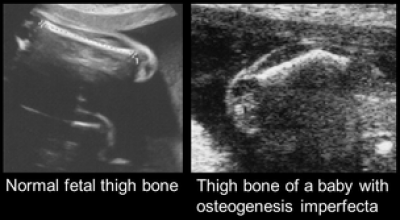Overview: Osteogenesis imperfecta (OI) is an inherited genetic disease characterised by brittle bones. When severe, babies present in the womb with fractures that can be seen on ultrasound scan. Patients with severe OI have repeated, multiple fractures through life, pain and handicap. There is no cure and current treatment is palliative. Fetal therapy using stem cells presents an opportunity. Transplantation before birth at the onset of disease may give better engraftment with less rejection than transplantation after birth. Mesenchymal stem cells (MSC) are promising candidates with minimal cancer risk.
Our aim is to develop prenatal and postnatal transplantation of MSC as a therapy for severe types of OI.
Design: We are conducting a multicentre case control study of MSC transplantation in severe types of OI (types II/III, severe type IV). We will compare prenatal (in utero) and postnatal transplantation and evaluate safety and efficacy outcomes (fracture frequency and growth). The multicentre study is lead by Sweden, with three other clinical centres at UCL, Koln in Germany, and Leiden in The Netherlands. We are also working with Great Ormond Street Hospital to develop non-invasive prenatal testing for OI.

Team: Dr Anna David, Dr Pascale Guillot, Professor Mark Lowdell (UCL Royal Free Biobank), Professor Lyn Chitty (Institute of Child Health), Dr Catherine De Vile (Great Ormond Street Hospital).
Funding: “Stem cell therapy to treat severe osteogenesis imperfecta”. Swedish Krona 16,500,000 (£1,357,887) over 3 years. Funded by a “Framework grant in clinical therapy research” from Swedish Research Council. Collaboration with Dr Cecilia Götherström and Professor Magnus Westgren.
Links: BOOSTB4
 Close
Close

